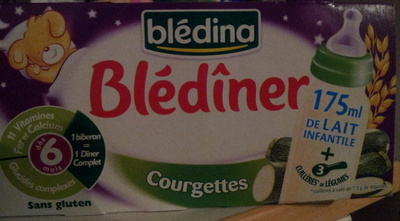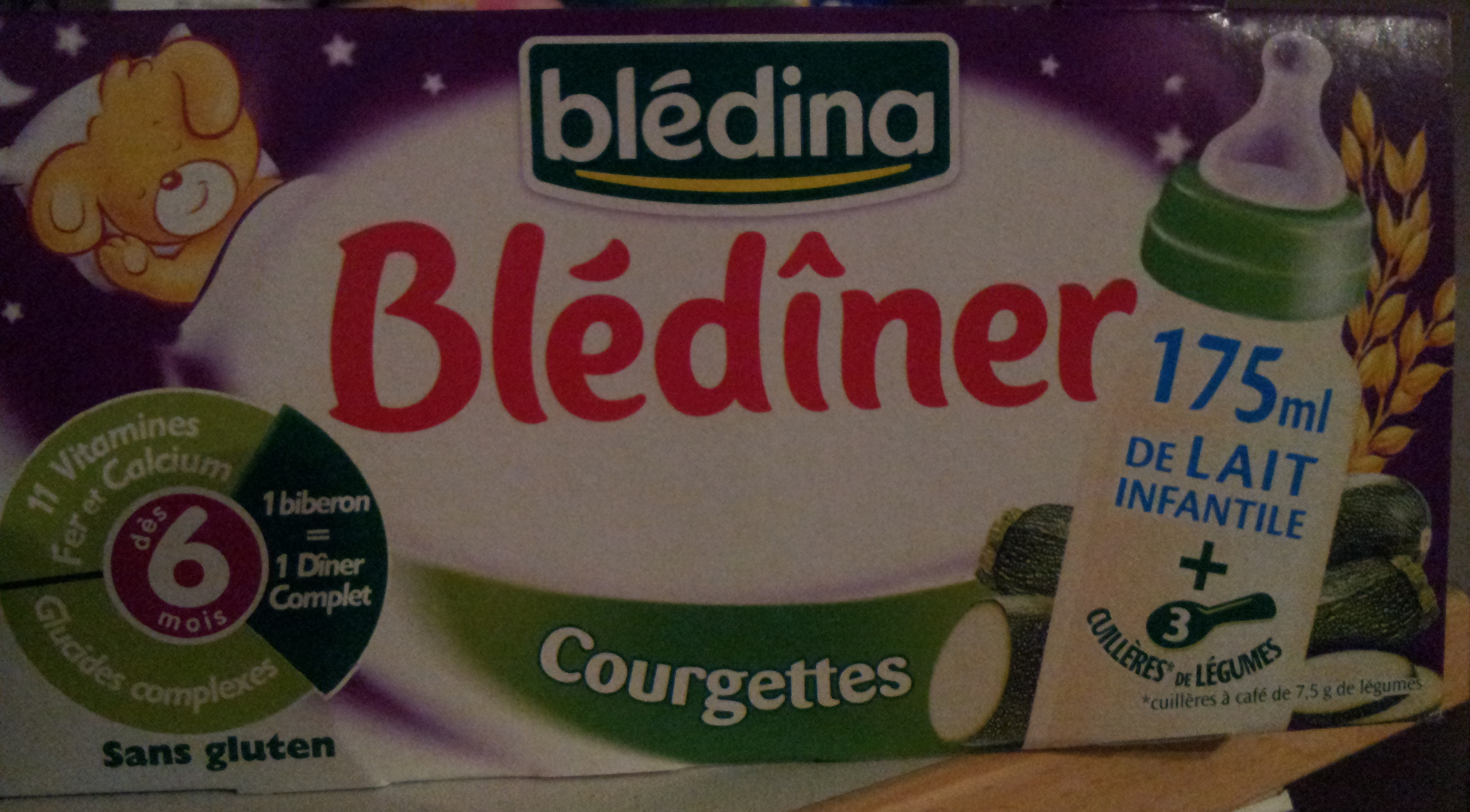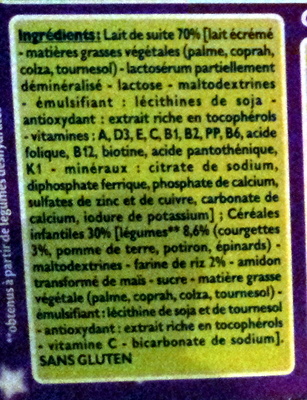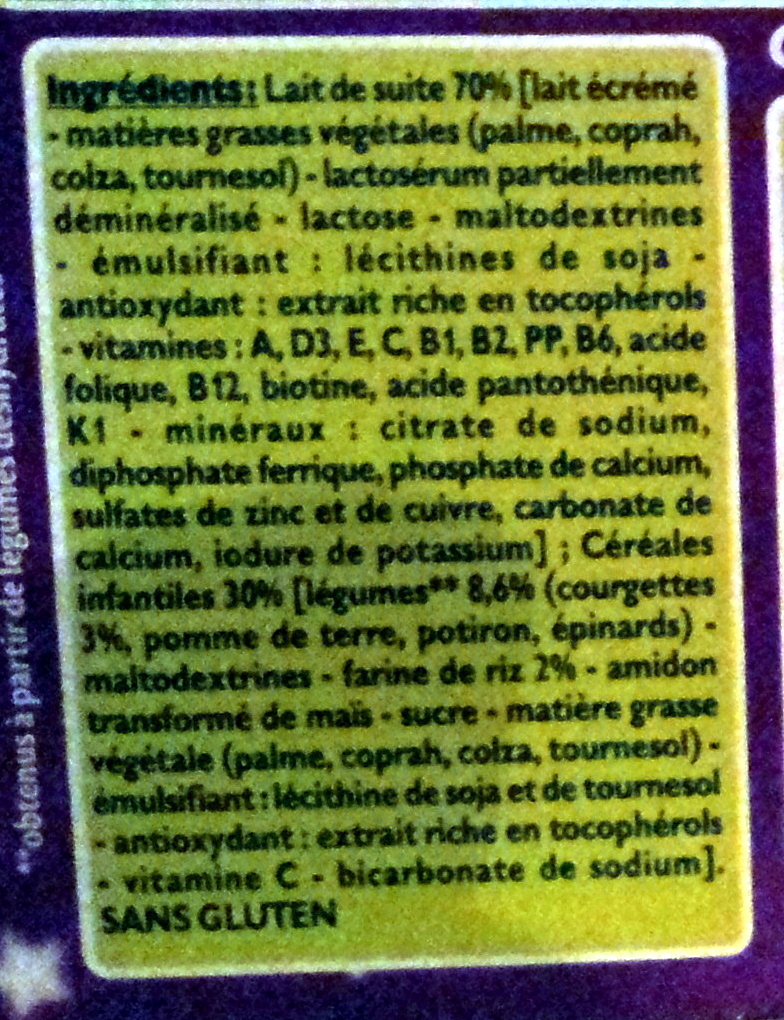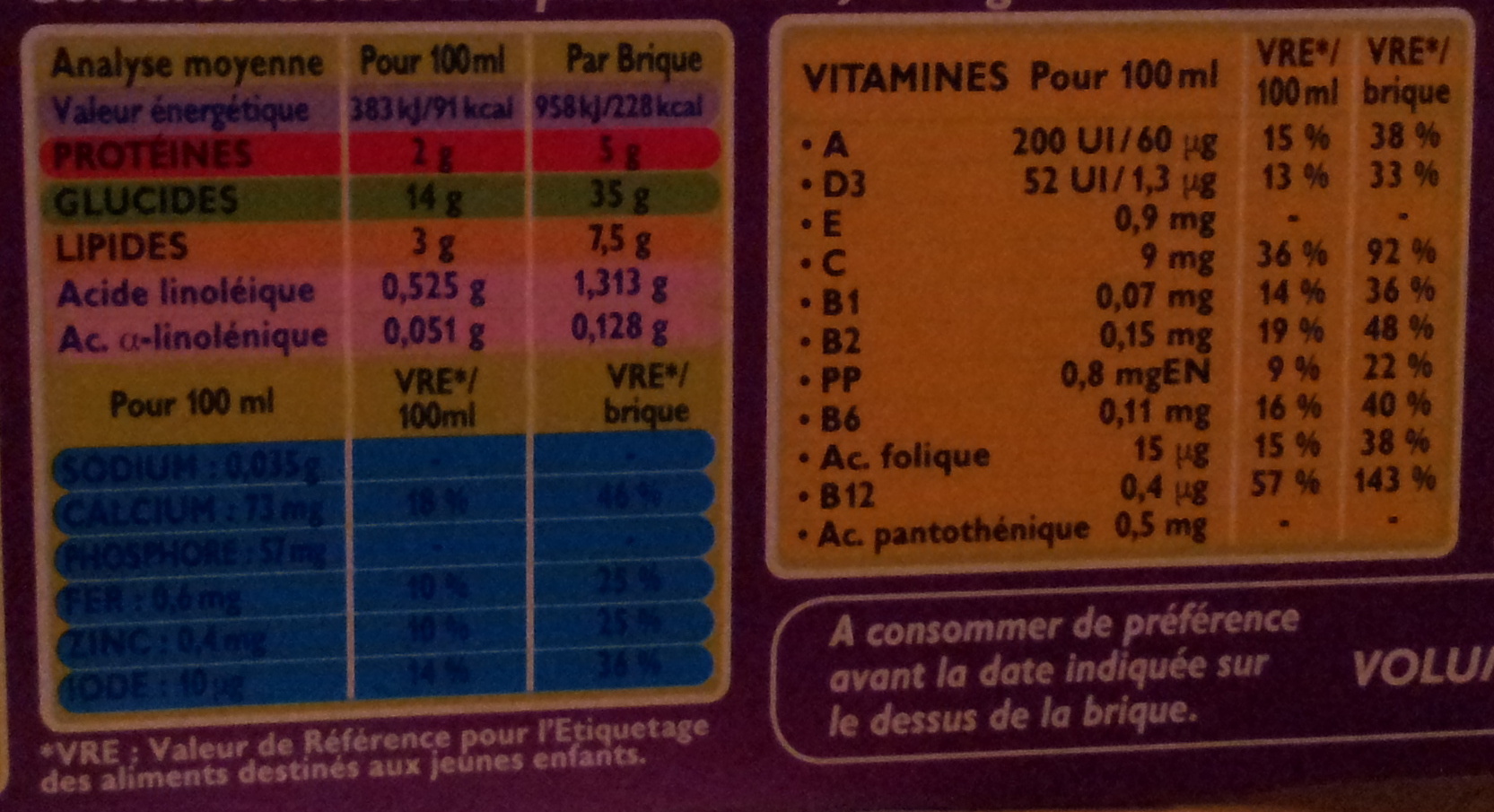Help us make food transparency the norm!
As a non-profit organization, we depend on your donations to continue informing consumers around the world about what they eat.
The food revolution starts with you!
Blediner - Mon repas complet du soir aux courgettes - Blédina - 534 g
Blediner - Mon repas complet du soir aux courgettes - Blédina - 534 g
This product page is not complete. You can help to complete it by editing it and adding more data from the photos we have, or by taking more photos using the app for Android or iPhone/iPad. Thank you!
×
Some of the data for this product has been provided directly by the manufacturer BLEDINA .
Barcode: 3041090013829 (EAN / EAN-13)
Common name: Céréales lactées pour bébés
Quantity: 534 g
Packaging: Brick, Cardboard, Pack
Brands: Blédina, Danone, Blédîner
Categories: Frozen foods, Baby foods, Baby milks, Cereals for babies, From 6 months
Labels, certifications, awards: No gluten, No preservatives, No colorings
Manufacturing or processing places: France
Traceability code: FR 59.580.030 CE - Steenvoorde (Nord, France)
Stores: Noz, Magasins U
Countries where sold: France
Matching with your preferences
Health
Ingredients
-
42 ingredients
: Eau - Lait écrémé 41,5 % (LAIT) - Maltodextrines - Matières grasses végétales (palme, coprah, colza, tournesol) - Farine de riz 1,9 % - Lactose (LAIT) - Amidon de maïs - Lactosérum déminéralisé (LAIT) - Flocons de pomme de terre - Flocons de courgette 0,4 % - Correcteurs d'acidité (bicarbonate de sodium, hydroxyde de potassium) - Emulsifiant : lécithine de soja (SOJA) - Vitamines(A, E, D3, K1, C, B1, B2, B3, B6, B9, B12, B5 et B8) - Minéraux (carbonate de calcium, diphosphate ferrique, sulfate de zinc et iodure de potassium) - Sucre - Dextrose - Antioxydant : extrait riche en tocophérolsAllergens: Milk, Soybeans
Food processing
-
Ultra processed foods
Elements that indicate the product is in the 4 - Ultra processed food and drink products group:
- Additive: E322 - Lecithins
- Ingredient: Dextrose
- Ingredient: Emulsifier
- Ingredient: Glucose
- Ingredient: Lactose
- Ingredient: Maltodextrin
- Ingredient: Whey
Food products are classified into 4 groups according to their degree of processing:
- Unprocessed or minimally processed foods
- Processed culinary ingredients
- Processed foods
- Ultra processed foods
The determination of the group is based on the category of the product and on the ingredients it contains.
Additives
-
E322 - Lecithins
Lecithins are natural compounds commonly used in the food industry as emulsifiers and stabilizers.
Extracted from sources like soybeans and eggs, lecithins consist of phospholipids that enhance the mixing of oil and water, ensuring smooth textures in various products like chocolates, dressings, and baked goods.
They do not present any known health risks.
-
E322i - Lecithin
Lecithins are natural compounds commonly used in the food industry as emulsifiers and stabilizers.
Extracted from sources like soybeans and eggs, lecithins consist of phospholipids that enhance the mixing of oil and water, ensuring smooth textures in various products like chocolates, dressings, and baked goods.
They do not present any known health risks.
-
E500 - Sodium carbonates
Sodium carbonates (E500) are compounds commonly used in food preparation as leavening agents, helping baked goods rise by releasing carbon dioxide when they interact with acids.
Often found in baking soda, they regulate the pH of food, preventing it from becoming too acidic or too alkaline. In the culinary world, sodium carbonates can also enhance the texture and structure of foods, such as noodles, by modifying the gluten network.
Generally recognized as safe, sodium carbonates are non-toxic when consumed in typical amounts found in food.
-
E500ii - Sodium hydrogen carbonate
Sodium hydrogen carbonate, also known as E500ii, is a food additive commonly used as a leavening agent.
When added to recipes, it releases carbon dioxide gas upon exposure to heat or acids, causing dough to rise and resulting in a light, fluffy texture in baked goods.
It is generally recognized as safe (GRAS) by regulatory authorities when used in appropriate quantities and poses no significant health risks when consumed in typical food applications.
-
E525 - Potassium hydroxide
Potassium hydroxide: Potassium hydroxide is an inorganic compound with the formula KOH, and is commonly called caustic potash. Along with sodium hydroxide -NaOH-, this colorless solid is a prototypical strong base. It has many industrial and niche applications, most of which exploit its corrosive nature and its reactivity toward acids. An estimated 700‚000 to 800‚000 tonnes were produced in 2005. About 100 times more NaOH than KOH is produced annually. KOH is noteworthy as the precursor to most soft and liquid soaps, as well as numerous potassium-containing chemicals.Source: Wikipedia
Ingredients analysis
-
Palm oil
Ingredients that contain palm oil: Palm
-
Non-vegan
Non-vegan ingredients: Skimmed milk, Lactose, Demineralised whey
-
Vegetarian status unknown
Unrecognized ingredients: Vitamin E, Thiamin, Folic acid, Vitamin b12, Ferric diphosphate, Zinc sulfate
-
Details of the analysis of the ingredients
: Eau, Lait écrémé 41.5%, Maltodextrines, Matières grasses végétales (palme, coprah, colza, tournesol), Farine de riz 1.9%, Lactose, Amidon de maïs, Lactosérum déminéralisé, Flocons de pomme de terre, courgette 0.4%, Correcteurs d'acidité (bicarbonate de sodium, hydroxyde de potassium), Emulsifiant (lécithine de soja), vitamines, vitamine A, vitamine E, vitamine D3, vitamine K1, vitamine C, vitamine B1, vitamine B2, vitamine B3, vitamine B6, vitamine B9, vitamine B12, vitamine B5, vitamine B8, Minéraux (carbonate de calcium, diphosphate ferrique, sulfate de zinc, iodure de potassium), Sucre, Dextrose, Antioxydant (extrait riche en tocophérols)- Eau -> en:water - vegan: yes - vegetarian: yes - ciqual_food_code: 18066 - percent_min: 41.5 - percent_max: 50.8
- Lait écrémé -> en:skimmed-milk - vegan: no - vegetarian: yes - ciqual_proxy_food_code: 19051 - percent_min: 41.5 - percent: 41.5 - percent_max: 41.5
- Maltodextrines -> en:maltodextrin - vegan: yes - vegetarian: yes - percent_min: 1.9 - percent_max: 11.2
- Matières grasses végétales -> en:vegetable-fat - vegan: yes - vegetarian: yes - from_palm_oil: maybe - percent_min: 1.9 - percent_max: 8.5
- palme -> en:palm - vegan: yes - vegetarian: yes - from_palm_oil: yes - ciqual_food_code: 16129 - percent_min: 0.475 - percent_max: 8.5
- coprah -> en:coconut-oil - vegan: yes - vegetarian: yes - from_palm_oil: no - ciqual_food_code: 16040 - percent_min: 0 - percent_max: 4.25
- colza -> en:colza-oil - vegan: yes - vegetarian: yes - from_palm_oil: no - ciqual_food_code: 17130 - percent_min: 0 - percent_max: 2.83333333333333
- tournesol -> en:sunflower - vegan: yes - vegetarian: yes - percent_min: 0 - percent_max: 2.125
- Farine de riz -> en:rice-flour - vegan: yes - vegetarian: yes - ciqual_food_code: 9520 - percent_min: 1.9 - percent: 1.9 - percent_max: 1.9
- Lactose -> en:lactose - vegan: no - vegetarian: yes - percent_min: 0.4 - percent_max: 1.9
- Amidon de maïs -> en:corn-starch - vegan: yes - vegetarian: yes - ciqual_food_code: 9510 - percent_min: 0.4 - percent_max: 1.9
- Lactosérum déminéralisé -> en:demineralised-whey - vegan: no - vegetarian: maybe - percent_min: 0.4 - percent_max: 1.9
- Flocons de pomme de terre -> en:potato-flakes - vegan: yes - vegetarian: yes - ciqual_food_code: 4003 - percent_min: 0.4 - percent_max: 1.71428571428571
- courgette -> en:courgette - vegan: yes - vegetarian: yes - ciqual_food_code: 20020 - percent_min: 0.4 - percent: 0.4 - percent_max: 0.4
- Correcteurs d'acidité -> en:acidity-regulator - percent_min: 0 - percent_max: 0.4
- bicarbonate de sodium -> en:e500ii - vegan: yes - vegetarian: yes - percent_min: 0 - percent_max: 0.4
- hydroxyde de potassium -> en:e525 - vegan: yes - vegetarian: yes - percent_min: 0 - percent_max: 0.2
- Emulsifiant -> en:emulsifier - percent_min: 0 - percent_max: 0.4
- lécithine de soja -> en:soya-lecithin - vegan: yes - vegetarian: yes - ciqual_food_code: 42200 - percent_min: 0 - percent_max: 0.4
- vitamines -> en:vitamins - vegan: yes - vegetarian: yes - percent_min: 0 - percent_max: 0.4
- vitamine A -> en:vitamin-a - vegan: yes - vegetarian: yes - percent_min: 0 - percent_max: 0.4
- vitamine E -> en:vitamin-e - percent_min: 0 - percent_max: 0.4
- vitamine D3 -> en:cholecalciferol - vegan: maybe - vegetarian: maybe - percent_min: 0 - percent_max: 0.4
- vitamine K1 -> en:phylloquinone - vegan: yes - vegetarian: yes - percent_min: 0 - percent_max: 0.4
- vitamine C -> en:e300 - vegan: yes - vegetarian: yes - percent_min: 0 - percent_max: 0.4
- vitamine B1 -> en:thiamin - percent_min: 0 - percent_max: 0.4
- vitamine B2 -> en:e101 - vegan: maybe - vegetarian: yes - percent_min: 0 - percent_max: 0.4
- vitamine B3 -> en:e375 - vegan: maybe - vegetarian: maybe - percent_min: 0 - percent_max: 0.4
- vitamine B6 -> en:vitamin-b6 - vegan: yes - vegetarian: yes - percent_min: 0 - percent_max: 0.4
- vitamine B9 -> en:folic-acid - percent_min: 0 - percent_max: 0.4
- vitamine B12 -> en:vitamin-b12 - percent_min: 0 - percent_max: 0.4
- vitamine B5 -> en:pantothenic-acid - vegan: yes - vegetarian: yes - percent_min: 0 - percent_max: 0.4
- vitamine B8 -> en:vitamin-b8 - vegan: yes - vegetarian: yes - percent_min: 0 - percent_max: 0.4
- Minéraux -> en:minerals - percent_min: 0 - percent_max: 0.4
- carbonate de calcium -> en:e170i - vegan: maybe - vegetarian: maybe - percent_min: 0 - percent_max: 0.4
- diphosphate ferrique -> en:ferric-diphosphate - percent_min: 0 - percent_max: 0.2
- sulfate de zinc -> en:zinc-sulfate - percent_min: 0 - percent_max: 0.133333333333333
- iodure de potassium -> en:potassium-iodide - vegan: yes - vegetarian: yes - ciqual_food_code: 11058 - percent_min: 0 - percent_max: 0.09
- Sucre -> en:sugar - vegan: yes - vegetarian: yes - ciqual_proxy_food_code: 31016 - percent_min: 0 - percent_max: 0.4
- Dextrose -> en:dextrose - vegan: yes - vegetarian: yes - ciqual_proxy_food_code: 31016 - percent_min: 0 - percent_max: 0.4
- Antioxydant -> en:antioxidant - percent_min: 0 - percent_max: 0.4
- extrait riche en tocophérols -> en:e306 - vegan: yes - vegetarian: yes - percent_min: 0 - percent_max: 0.4
Nutrition
-
Nutri-Score not-applicable
Not-applicable for the category: Baby foods
⚠ ️Nutri-Score not applicable for this product category.Could you add the information needed to compute the Nutri-Score?
-
Nutrition facts
Nutrition facts As sold
for 100 g / 100 mlAs sold
per serving (250ml (une brique))Compared to: Cereals for babies Energy 367 kj
(87 kcal)918 kj
(218 kcal)-75% Fat 2.8 g 7 g -9% Saturated fat 1.2 g 3 g +45% Alpha-linolenic acid 0.05 g 0.125 g +4% Linoleic acid 0.47 g 1.17 g -2% Carbohydrates 13.5 g 33.8 g -80% Sugars 5.3 g 13.2 g -65% Fiber 0.2 g 0.5 g -93% Proteins 2 g 5 g -77% Salt 0.09 g 0.225 g +12% Vitamin A 95 µg 237 µg -66% Vitamin D 1.2 µg 3 µg -81% Vitamin E 1.19 mg 2.97 mg -65% Vitamin K 11.8 µg 29.5 µg +11% Vitamin C (ascorbic acid) 11.5 mg 28.8 mg -74% Vitamin B1 (Thiamin) 0.18 mg 0.45 mg -79% Vitamin B2 (Riboflavin) 0.22 mg 0.55 mg -50% Vitamin B3/PP (Niacin) 1.4 mg 3.5 mg -68% Vitamin B6 (Pyridoxin) 0.15 mg 0.375 mg -54% Vitamin B9 (Folic acid) 19 µg 47.5 µg -65% Vitamin B12 (cobalamin) 0.3 µg 0.75 µg -40% Biotin 6.8 µg 17 µg -50% Vitamin B5 (Pantothenic acid) 0.4 mg 1 mg -70% Potassium 85 mg 213 mg -54% Calcium 73 mg 182 mg -61% Phosphorus 47 mg 117 mg -66% Iron 0.6 mg 1.5 mg -92% Zinc 0.3 mg 0.75 mg -77% Iodine 10 µg 25 µg -79% Fruits‚ vegetables‚ nuts and rapeseed‚ walnut and olive oils (estimate from ingredients list analysis) 0.822 % 0.822 %
Environment
-
Eco-Score B - Low environmental impact
⚠ ️Select a country in order to include the full impact of transportation.The Eco-Score is an experimental score that summarizes the environmental impacts of food products.→ The Eco-Score was initially developped for France and it is being extended to other European countries. The Eco-Score formula is subject to change as it is regularly improved to make it more precise and better suited to each country.Life cycle analysis
-
Average impact of products of the same category: A (Score: 94/100)
Category: Baby milk, first milk, ready to feed
Category: Baby milk, first milk, ready to feed
- PEF environmental score: 0.15 (the lower the score, the lower the impact)
- including impact on climate change: 1.53 kg CO2 eq/kg of product
Stage Impact Agriculture
71.0 %Processing
1.0 %Packaging
9.6 %Transportation
10.7 %Distribution
6.0 %Consumption
1.7 %
Bonuses and maluses
-
Missing origins of ingredients information
Malus: -5
⚠ ️ The origins of the ingredients of this product are not indicated.
If they are indicated on the packaging, you can modify the product sheet and add them.
If you are the manufacturer of this product, you can send us the information with our free platform for producers.
-
Ingredients that threatens species
Malus: -10
Contains palm oil
Tropical forests in Asia, Africa and Latin America are destroyed to create and expand oil palm tree plantations. The deforestation contributes to climate change, and it endangers species such as the orangutan, the pigmy elephant and the Sumatran rhino.
-
Packaging with a high impact
Malus: -15
Shape Material Recycling Impact Packet Cardboard Low Brick Unknown High Packet Unknown High ⚠ ️ The information about the packaging of this product is not sufficiently precise (exact shapes and materials of all components of the packaging).⚠ ️ For a more precise calculation of the Eco-Score, you can modify the product page and add them.
If you are the manufacturer of this product, you can send us the information with our free platform for producers.
Eco-Score for this product
-
Impact for this product: B (Score: 64/100)
Product: Blediner - Mon repas complet du soir aux courgettes - Blédina - 534 g
Life cycle analysis score: 94
Sum of bonuses and maluses: -30
Final score: 64/100
-
Carbon footprint
-
Equal to driving 0.8 km in a petrol car
153 g CO² per 100g of product
The carbon emission figure comes from ADEME's Agribalyse database, for the category: Baby milk, first milk, ready to feed (Source: ADEME Agribalyse Database)
Stage Impact Agriculture
73.4 %Processing
0.7 %Packaging
9.7 %Transportation
13.4 %Distribution
2.3 %Consumption
0.4 %
Packaging
-
Packaging with a high impact
-
Packaging parts
Packet (Cardboard)
Brick
Packet
-
Packaging materials
Material % Packaging weight Packaging weight per 100 g of product Paper or cardboard
-
Transportation
-
Origins of ingredients
Missing origins of ingredients information
⚠ ️ The origins of the ingredients of this product are not indicated.
If they are indicated on the packaging, you can modify the product sheet and add them.
If you are the manufacturer of this product, you can send us the information with our free platform for producers.Add the origins of ingredients for this product Add the origins of ingredients for this product
Threatened species
-
Contains palm oil
Drives deforestation and threatens species such as the orangutan
Tropical forests in Asia, Africa and Latin America are destroyed to create and expand oil palm tree plantations. The deforestation contributes to climate change, and it endangers species such as the orangutan, the pigmy elephant and the Sumatran rhino.
Other information
Preparation: Brique prête à l'emploi ou à consommer tiède. Ne pas faire bouillir, ni chauffer la brique directement au four à micro-ondes. Ne pas ajouter de sucre.
Conservation conditions: Avant ouverture, à conserver à température ambiante dans un endroit propre et sec. Après ouverture, à conserver au réfrigérateur et à consommer dans les 48 h maximum.
Customer service: blédina SAS - CS13754 - 81 rue de Sans Souci - 69576 Limonest Cedex, blédina SAS - CS13754 - 81 rue de Sans Souci - 69576 Limonest Cedex
Report a problem
-
Incomplete or incorrect information?
Category, labels, ingredients, allergens, nutritional information, photos etc.
If the information does not match the information on the packaging, please complete or correct it. Open Food Facts is a collaborative database, and every contribution is useful for all.
Data sources
The manufacturer BLEDINA uses CodeOnline Food to automatically transmit data and photos for its products.
Manufacturers can use the Open Food Facts free plaform for producers to access and complete this data, and to obtain reports, analysis and product improvements opportunities (e.g. better Nutri-Score).
Product added on by openfoodfacts-contributors
Last edit of product page on by quechoisir.
Product page also edited by date-limite-app, loverock, magasins-u, manu1400, nioff, org-bledina, packbot.
